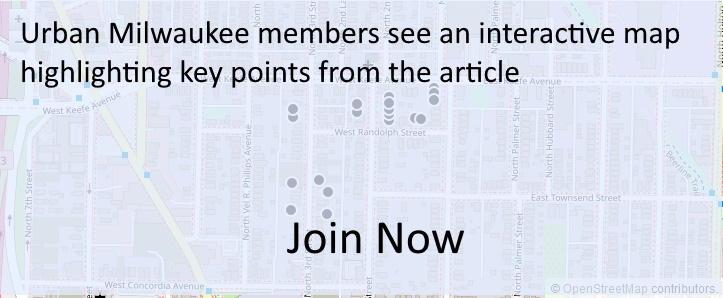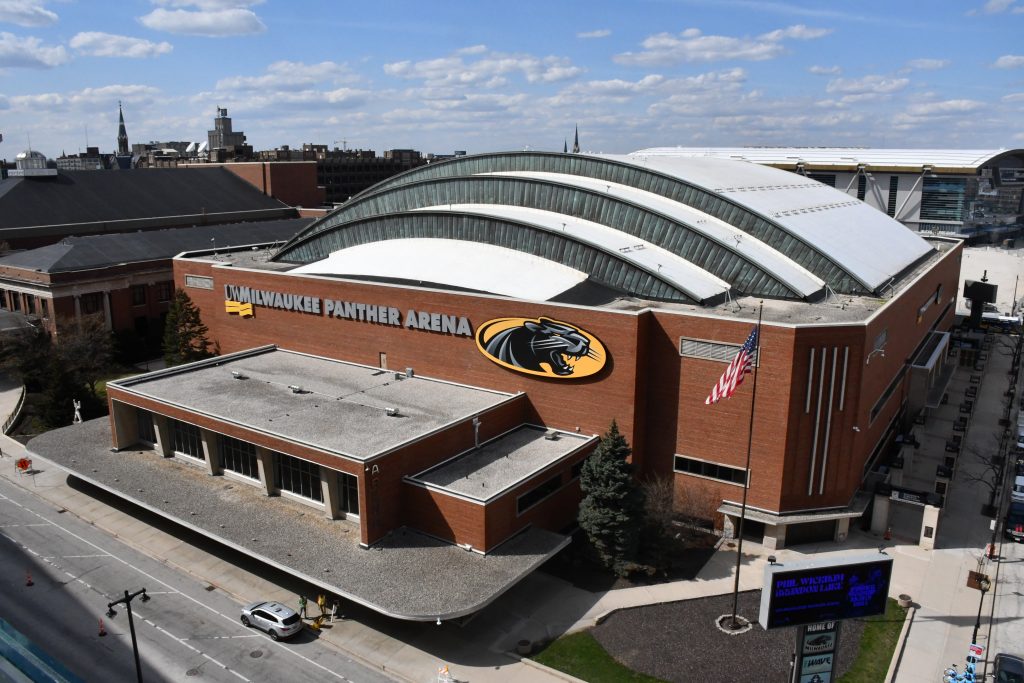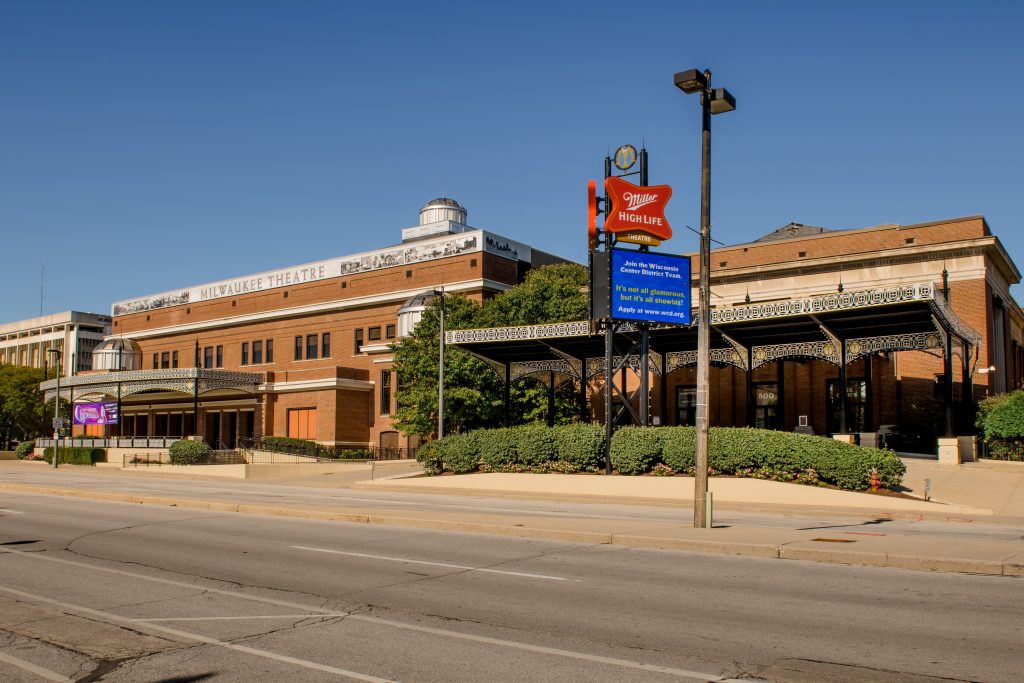Historic Designations For Milwaukee Auditorium, Arena Is Strategic Move
Aiming to slow redevelopment? It's all about 'transparency' says Ald. Bob Bauman.
Alderman Robert Bauman is a master of finding leverage.
And he’s potentially found a lot of it in nominating the Miller High Life Theatre and UW-Milwaukee Panther Arena for local historic designation.
The Wisconsin Center District (WCD) could demolish the buildings as part of the development of a large, convention hotel connected to the Baird Center.
Consulting firm Hunden Partners is conducting a study on the highest and best use for the properties, which cover a 6.4-acre site along W. Kilbourn Avenue. The report is expected to be completed in January. WCD is already moving to make all of the tenant leases and naming rights agreements expire no later than 2029.
Bauman, who represents the area and serves on the WCD board, said during Monday’s Historic Preservation Commission (HPC) meeting that he nominated the buildings to ensure the public had a voice in any future changes to them.
“The public should be allowed to weigh in in a transparent, open process, which this designation will facilitate,” said Bauman.
Designation would not prevent demolition or alteration, but it does require either HPC or Common Council approval.
But the WCD opposes Bauman’s nomination.
“It seems like there is no urgent need unless the need is to interrupt development,” said Joshua Levy, an attorney with Husch Blackwell representing WCD.
“Interrupt what development?” asked Bauman, referring to a past statement by WCD CEO Marty Brooks that nothing has been finalized.
“Development could be redeveloping the existing property in some different form, changing the uses of the existing property,” said Levy. He said whatever happens following the report would be “development.”
“That’s news to me and news to the public,” said Bauman.
“The client said there is no plan to demolish these buildings, he didn’t say there is no plan for redevelopment,” said Levy.
“You’re basically disclosing my whole point here,” said Bauman. “There is a plan that hasn’t been publicly disclosed that should be publicly disclosed.”
He said he believes the Hunden Partners report has been largely drafted already.
Levy said Bauman’s move was an attempt to prevent development.
“I don’t know how many times I have to say it. Not to prevent anything, but to create transparency. You’re essentially arguing for no transparency. The Wisconsin Center District board does not want the public involved in this decision,” responded Bauman.
Bauman, who currently chairs the preservation commission, drew support from fellow commissioners Patti Keating Kahn and Matt Jarosz.
Levy also challenged the nature of the nomination and resulting report, which he said rehashed a 2000 report when the Milwaukee Auditorium, now the theater, was nominated and rejected by the commission.
HPC senior planner Andrew Stern said he did rely on the prior report because “history is history” and it was well prepared.
Levy also said the structures have been around for years and the city should be more proactive in nominations.
“The timing is totally irrelevant. If it qualifies as historic, it is historic,” said Bauman.
The commission unanimously endorsed the historic designation.
The council’s Zoning, Neighborhoods & Development Committee will next review the nomination. Adding to his leverage, Bauman also chairs that committee.
Brooks, the WCD CEO, issued a statement after the HPC meeting. “The WCD appreciates the opportunity the historical preservation commission gave us to speak on the proposal to designate the arena and theater as a historical site and look forward to explaining our position with Common Council members. We reiterate that the only development plans the WCD is engaged in is asking Hunden Partners to develop a best and highest usage study to present to the Board of Directors in January. Any opportunities presented in the study would be subject to a robust discussion with the WCD Board and other city, county and state stakeholders, just like the process that took place when we proposed expanding the Baird Center in 2020,” he said.
Brief building history
Both buildings have been part of Milwaukee’s civic and social fabric for decades.
The Miller High Life Theatre was completed in 1909.
“Milwaukee was extremely excited and hungry for this building,” said Stern of the days of celebration that followed its opening.
Previously known as the Milwaukee Auditorium and then, after a 2000 renovation, the Milwaukee Theatre, the building has hosted everything from a Herman’s Hermits concert to a Ku Klux Klan rally. It was a home for soldiers leaving for World War I and still hosts shows today.
Most notably, it hosted Theodore Roosevelt‘s 1912 campaign speech after he was shot.
“Friends, I shall ask you to be as quiet as possible. I don’t know whether you fully understand that I have just been shot—but it takes more than that to kill a bull moose,” said Roosevelt.
It’s also architecturally significant, said Stern.
“The auditorium was the first new building constructed in what was the grand new idea in the city of Milwaukee for a civic center,” he said. The structure was designed by famed area firm Ferry & Clas.
The neighboring Milwaukee Arena, later the MECCA Arena and currently the UW-Milwaukee Panther Arena, opened in 1950. It was designed by Eschweiler & Eschweiler.
It has hosted several teams, including the Milwaukee Bucks, Hawks and Admirals and the Marquette University and UW-Milwaukee men’s basketball teams, as well as several presidents, including John F. Kennedy, Bill Clinton, Barack Obama and Donald Trump.
A multimillion-dollar renovation was undertaken in 2014 that included replacing the scoreboard and seats and making several other upgrades.
The UWM men’s basketball team and the Milwaukee Admirals both still play in the building. And both organizations have made statements opposing demolition.
“Largely, the buildings are both intact as they were when they were constructed,” said Stern. “It’s really difficult to overstate just how immensely important both of these developments were to the development of Milwaukee.”
The buildings, said Stern, are worthy of designation for their architectural significance, connection with significant local events and association with the development of the city’s history.
For more on possible redevelopment plans, see Urban Milwaukee’s September coverage.
Legislation Link - Urban Milwaukee members see direct links to legislation mentioned in this article. Join today
Existing members must be signed in to see the interactive map. Sign in.
If you think stories like this are important, become a member of Urban Milwaukee and help support real, independent journalism. Plus you get some cool added benefits.
More about the Convention Hotel Debate
- Live Nation Expansion Could Erase 117-Year-Old Historic Milwaukee Venue, NIVA Pushes Back - Press Release - Feb 2nd, 2026
- Convention Hotel, Theater Demolition Plan Gets Cold Reception - Jeramey Jannene - Jan 30th, 2026
- Report Suggests Demolishing Historic Building For Convention Center Hotel - Jeramey Jannene - Jan 29th, 2026
- Mayor Declines to Sign Historic Preservation for Arena, Auditorium - Jeramey Jannene - Dec 9th, 2025
- Council Committee Says Milwaukee Theater, Arena Are Historic - Jeramey Jannene - Nov 18th, 2025
- Historic Designations For Milwaukee Auditorium, Arena Is Strategic Move - Jeramey Jannene - Nov 4th, 2025
- Future of Panther Arena, High Life Theatre Uncertain - Jeramey Jannene - Sep 26th, 2025
- $456 Million Baird Center Opens With Big Promises, Vision - Jeramey Jannene - May 16th, 2024
- Plats and Parcels: 11 Key Details About the Convention Center Expansion - Jeramey Jannene - Mar 8th, 2020
Read more about Convention Hotel Debate here
Political Contributions Tracker
Displaying political contributions between people mentioned in this story. Learn more.
- October 13, 2019 - Robert Bauman received $100 from Patti Keating Kahn
- March 23, 2017 - Robert Bauman received $250 from Patti Keating Kahn
- May 10, 2016 - Robert Bauman received $250 from Patti Keating Kahn























Man what a bummer. Just imagine if MECCA was “historically” protected too?
These buildings are part of Milwaukee’s heritage. How many remember when the Holiday Folk Festival spread across both buildings. That was back during a time when Milwaukee’s Folk Festival was one of the largest in the country, drawing dancers, musicians, and ethnic craft booths from surrounding states.
No developer should be allowed to draw up any plans for these building–including demolition and major renovation–without public input and approval. Our heritage and history are not up for sale.